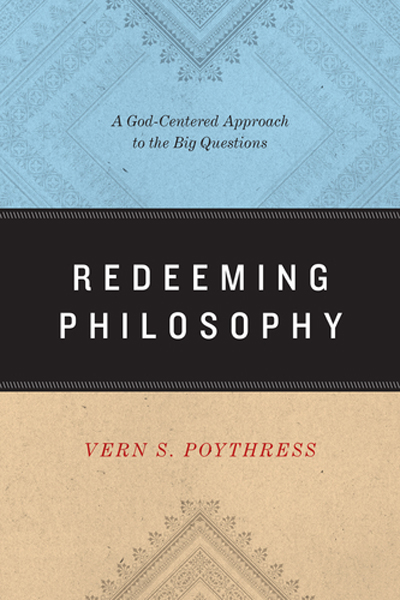Vern Poythress: Redeeming Philosophy
 Vern S. Poythress, Redeeming Philosophy: A God-Centered Approach to the Big Questions (Wheaton, IL: Crossway, 2014), 303 pages.
Vern S. Poythress, Redeeming Philosophy: A God-Centered Approach to the Big Questions (Wheaton, IL: Crossway, 2014), 303 pages.
Vern S. Poythress is professor of New Testament interpretation at Westminster Theological Seminary, where he has taught for nearly four decades. In addition to earning six academic degrees, including a PhD from Harvard University and a ThD from the University of Stellenbosch, he is the author of numerous books and articles on a variety of topics, including biblical interpretation, language, and science. Life is full of big questions, and philosophy over the centuries has sought to answer such questions. In this book, Poythress investigates the foundations and limitations of Western philosophy, developing a distinctly Christian approach to answering basic questions about the nature of humanity, the existence of God, the search for meaning, and the basis for morality.
Building from a theological methodology based on the work of John Frame, Poythress writes this introductory exploration of the relationship between philosophy and the teachings of Scripture. Philosophers generally divide their discipline so that they can answer smaller sets of questions. Three of these subdisciplines are metaphysics, epistemology, and philosophical ethics. Metaphysics studies questions about existence, such as Why does anything exist? And, What is the nature of what exists? Epistemology studies the nature of knowledge: What is knowledge? How do we come to know what we know? When can we be sure that we have accurate knowledge, as opposed to mistaken ones. Philosophical ethics studies issues of right and wrong: What are moral standards? Are these standards universal? Where do these standards come from?
Metaphysics considers questions about what exists, which includes questions about God. For example, does God exist? If he does, what kind of God is he? Does he hold us morally accountable? Materialists do not think so – that is, those who think that the ultimate nature of the world is material. Philosophers have debated metaphysics for centuries, and materialism in one form or another has been advocated by some since at least the ancient Greeks. People who believe in God, however, say that matter and motion are not all that exist. They believe that God exists, created matter and motion, and everything else as well. Theists claim that materialists ignore important dimensions of reality that point to the existence of a deity. People disagree about metaphysical issues, and these disagreements lead invariably also to disagreements about knowledge, i.e. epistemological issues. Questions about how we come to know things, in turn, interact with questions about metaphysics and ethics. Conversely, answers to metaphysical questions have an influence on epistemology and ethics.
All three subdivisions of philosophy – metaphysics, epistemology, and ethics – offer perspectives on one another.
Category: In Depth, Summer 2016


